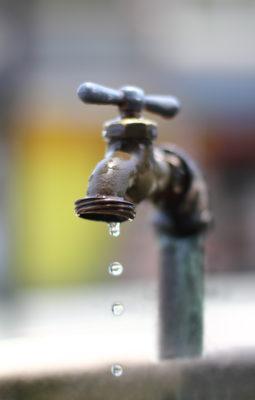Conserving our limited water supplies is always a good idea, but did you know there is also a direct connection between water and energy use?
Delivering water and wastewater services is an energy-intensive effort, as th e water is treated, pumped to our homes and businesses, then pumped to wastewater facilities to be treated again. The EPA estimates 3 to 4 percent of national electricity consumption, equivalent to approximately 56 billion kilowatts (kW), or $4 billion, is used in providing drinking water and wastewater services each year.
e water is treated, pumped to our homes and businesses, then pumped to wastewater facilities to be treated again. The EPA estimates 3 to 4 percent of national electricity consumption, equivalent to approximately 56 billion kilowatts (kW), or $4 billion, is used in providing drinking water and wastewater services each year.
As we head into the hot, and sometimes parched, months of the year, here are some simple and smart things that reduce the amount of water wasted in our daily routines for our homes, lawns and gardens.
In the Bathroom
Check for, and fix, leaks. Add 3 drops of food coloring to your toilet tank to check for leaks. If the water in the bowl has changed color after 30 minutes, replace the flapper valve. Repair dripping faucets right away. A faucet dripping at a rate of one drop per second wastes about 2,700 gallons per year, and a running toilet can use up to 200 gallons per day.
Install low flow shower heads and faucet aerators. A typical shower head uses up to 5 gallons of water per minute, while low flow heads only use 1.5 gallons per minute. While you’re at it, take shorter showers. Aerators add air to the stream coming out of your faucet, reducing the amount of water used per minute and you won’t even notice.
Turn off the water while brushing teeth or shaving. Fill the sink or shower with just enough water to rinse the toothbrush or razor instead of letting the water run.
Decrease water use per flush. Fill a small milk jug with water and place it in your toilet’s tank, or install a toilet tank bladder. This acts to displace water and can save gallons each day. You can also simply flush less frequently.
Look for the WaterSense label. The City of Charlottesville offers a $100 WaterSense toilet rebate, which is often sufficient to cover the entire cost of the toilet. Toilets generally account for 30% of your indoor water use. Replacing an inefficient model can save the average family of 4 over 20,000 gallons of water per year.
In the Kitchen
Use your dishwasher. Washing dishes by hand uses more water and energy than a dishwasher. Only run the dishwasher and laundry when you have a full load. Scrape or wipe your dishes before putting them in the dishwasher instead of rinsing. And of course, select an ENERGY STAR® model when purchasing a dishwasher.
Keep a pitcher of water in the refrigerator rather than running the tap to get a cold drink.
Designate one glass a day for water, or carry a reusable water bottle to reduce the number of times you run your dishwasher.
Thaw frozen vegetables in the fridge instead of running water over them and consider composting instead of running your garbage disposal.
Outside
Install rain barrels on downspouts to collect rainwater for plants, lawns and car washing. Water from rain barrels is exempt from drought restrictions and the City of Charlottesville offers a $30 rebate per barrel for up to two barrels.
Water in the morning or later in the evening when the sun is weakest to avoid evaporation, and make sure sprinklers are not watering driveways or sidewalks and reposition them if necessary.
Select drought resistant plants suitable for our climate and use mulch to retain moisture and control weeds that compete with landscape plants for water.
Use a broom – not a hose – to clean sidewalks and driveways and use a bucket when washing your car. Only use the hose when you want to rinse the car.
This one’s hard if you have small children, but try to avoid recreational toys requiring a constant stream of water, or at least limit their use.
The average household in Charlottesville uses 3,703 gallons of water a month, and every drop truly does count. If you have some work to do on your water conservation skills, just pick two or three things to concentrate on in the beginning. Once those are habits, add a few more. In no time at all, you’ll be a water saving whiz!
